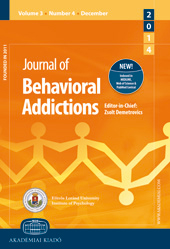Policy responses to problematic video game use: A systematic review of current measures and future possibilities
Policy responses to problematic video game use: A systematic review of current measures and future possibilities
Author(s): Orsolya Király, Mark D. Griffiths, Daniel L. King, Hae Kook Lee, Seung-Yup Lee, Fanni Bányai, Agnes Zsila, Zsófia Katalin Takács, Zsolt DemetrovicsSubject(s): Psychology, Behaviorism
Published by: Akadémiai Kiadó
Keywords: problematic video game playing; Internet Gaming Disorder; gaming policy; gaming addiction regulation
Summary/Abstract: Background and aims. Empirical research into problematic video game playing suggests that overuse might cause functional and psychological impairments for a minority of gamers. Therefore, the need for regulation in the case of video games (whether governmental or self-imposed) has arisen but has only been implemented in a few countries around the world, and predominantly in Asia. This paper provides a systematic review of current and potential policies addressing problematic gaming. Methods. After conducting a systematic search in the areas of prevention, treatment, and policy measures relating to problematic Internet and video game use, papers were selected that targeted problematic gaming policies (N = 12; six in English and six in Korean). These papers served as the basis of this review. Results. Policies were classified into three major groups: (i) policy measures limiting availability of video games (e.g., shutdown policy, fatigue system, and parental controls), (ii) measures aiming to reduce risk and harm (e.g., warning messages), and (iii) measures taken to provide help services for gamers. Beyond the attempt to classify the current and potential policy measures, the authors also tried to evaluate their efficiency theoretically and (if data were available) empirically. Discussion and conclusions. Overall, it appears that although several steps have been taken to address problematic video game playing, most of these steps were not as effective as expected, or had not been evaluated empirically for efficacy. The reason for this may lie in the fact that the policies outlined only addressed or influenced specific aspects of the problem instead of using a more integrative approach.
Journal: Journal of Behavioral Addictions
- Issue Year: 7/2018
- Issue No: 3
- Page Range: 503-517
- Page Count: 15
- Language: English

